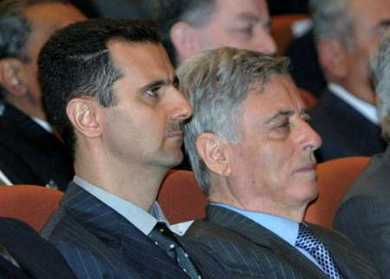 (AFP), 31 december 2005, DAMASCUS – Syrian lawmakers called on Saturday for former vice president Abdel Halim Khaddam to face treason charges after his dramatic revelations that President Bashar Al Assad threatened former Lebanese premier Rafiq Hariri just months before his murder.
(AFP), 31 december 2005, DAMASCUS – Syrian lawmakers called on Saturday for former vice president Abdel Halim Khaddam to face treason charges after his dramatic revelations that President Bashar Al Assad threatened former Lebanese premier Rafiq Hariri just months before his murder.
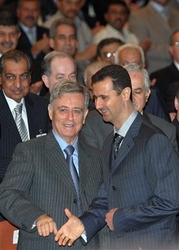 DUBAI (Reuters) – A former Syrian vice president launched an unprecedented attack on President Bashar al-Assad, saying he had threatened Rafik al-Hariri, the former Lebanese prime minister who was assassinated in February. "Assad told me he had delivered some very, very harsh words to Hariri … something like ‘I will crush anyone who tries to disobey us’," Abdel-halim Khaddam said from his home in Paris.
DUBAI (Reuters) – A former Syrian vice president launched an unprecedented attack on President Bashar al-Assad, saying he had threatened Rafik al-Hariri, the former Lebanese prime minister who was assassinated in February. "Assad told me he had delivered some very, very harsh words to Hariri … something like ‘I will crush anyone who tries to disobey us’," Abdel-halim Khaddam said from his home in Paris.
A veteran aide to Bashar’s father, the late Syrian President Hafez al-Assad, Khaddam resigned in June. He was speaking in an interview with Al Arabiya television aired on Friday.Khaddam would not speculate on who had ordered Hariri’s murder, saying "we must wait" for the final results of an investigation being carried out by the United Nations. That investigation has implicated senior Syrian officials and Khaddam’s comments are likely to intensify pressure on Damascus.Khaddam noted: "In principle, no government body in Syria, be it a security apparatus or otherwise, can single-handedly take this decision (killing Hariri)," he said. "Bashar has said that if anybody in Syria was involved, that means I am involved."
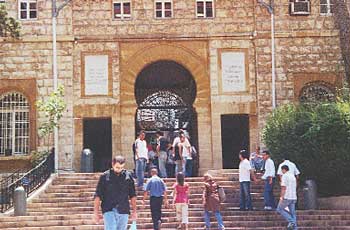 By Marvine Howe, AUB, as the school is generally known, is still mourning its martyrs from Lebanon
By Marvine Howe, AUB, as the school is generally known, is still mourning its martyrs from Lebanon
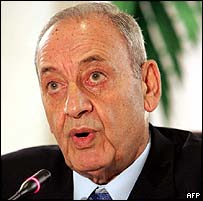 The Lebanese cabinet crisis persists even though Hizb Allah and Amal, the two principal Shia political groups, have affirmed in a joint statement their commitment to a deal recently reached with Saad al-Hariri, the leader of the anti-Syian Future bloc, Aljazeera reports.The deal recognises Hizb Allah’s armed resistance as legitimate as long as the Shebaa Farms remain occupied by Israel and Lebanese prisoners languish in Israeli jails.
The Lebanese cabinet crisis persists even though Hizb Allah and Amal, the two principal Shia political groups, have affirmed in a joint statement their commitment to a deal recently reached with Saad al-Hariri, the leader of the anti-Syian Future bloc, Aljazeera reports.The deal recognises Hizb Allah’s armed resistance as legitimate as long as the Shebaa Farms remain occupied by Israel and Lebanese prisoners languish in Israeli jails.
The announcement was made on Friday after a meeting of the leaders of the two pro-Syrian Shia political groups at Ein Al-Tineh in Beirut, the Lebanese capital.Aljazeera reported quoting Hizb Allah and Amal leaders that they were now awaiting the translation of the accord into concrete action.The two Shia groups have been boycotting the cabinet for days now over differences with the Future bloc and its allies for their approach to the assassinations of anti-Syrian personalities, especially former prime minister Rafiq al-Hariri.
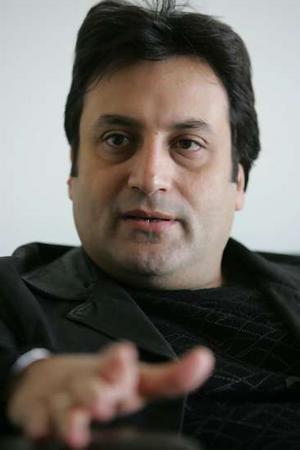 By Ayat Basma BEIRUT, Dec 30 (Reuters) – A year after he predicted a rash of political killings and upheaval, Lebanon’s most famous clairvoyant will not tell a jittery public what 2006 holds when he makes his usual end-year television appearance. Thousands of Lebanese tune in every New Year’s Eve to hear what Michel Hayek foresees, but the 38-year-old said he no longer wanted to be seen as the bearer of bad news.
By Ayat Basma BEIRUT, Dec 30 (Reuters) – A year after he predicted a rash of political killings and upheaval, Lebanon’s most famous clairvoyant will not tell a jittery public what 2006 holds when he makes his usual end-year television appearance. Thousands of Lebanese tune in every New Year’s Eve to hear what Michel Hayek foresees, but the 38-year-old said he no longer wanted to be seen as the bearer of bad news.
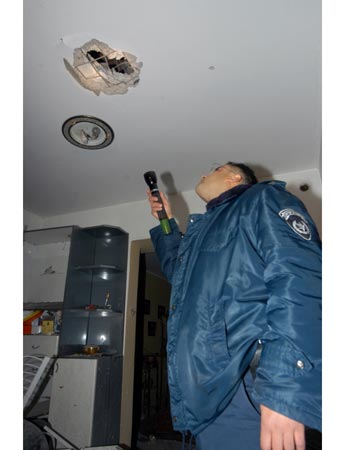 Associated Press, Army engineers in south Lebanon dismantled Friday two rockets mounted for firing at Israel, a senior military official said of a move that suggested Lebanon was exerting greater control over its border area. "The two rockets were found in an orchard in the border town of Naqoura," the official told the Associated Press, adding that the army was investigating who owned the rockets and had searched the area for more. The incident came three days after Lebanese-based guerrillas fired rockets into northern Israel, causing damage to the town of Kiryat Shmona and lightly injuring four people.
Associated Press, Army engineers in south Lebanon dismantled Friday two rockets mounted for firing at Israel, a senior military official said of a move that suggested Lebanon was exerting greater control over its border area. "The two rockets were found in an orchard in the border town of Naqoura," the official told the Associated Press, adding that the army was investigating who owned the rockets and had searched the area for more. The incident came three days after Lebanese-based guerrillas fired rockets into northern Israel, causing damage to the town of Kiryat Shmona and lightly injuring four people.
In a rare rebuke, Lebanon’s Prime Minister Fuad Saniora condemned the rocket attack and said his government would catch the perpetrators to make sure it did not happen again. Although it was not the first time that Lebanese soldiers had seized rockets in southern Lebanon, Friday’s dismantling suggested the army was being more vigilant following Saniora’s remarks. The jets also flew over a PFLP-GC base in Sultan Yacoub, a village about 5 kilometers (3 miles) from the Syrian border, security officials said.
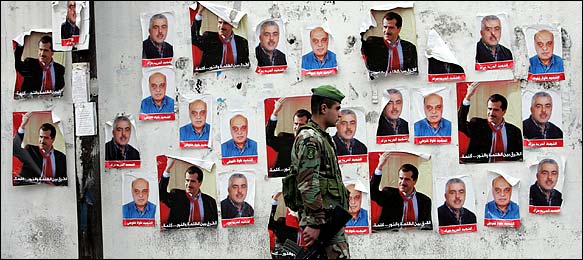 By MICHAEL SLACKMAN, BEIRUT, Lebanon Dec. 29 – The roadblocks begin a few miles before Gen. Michel Aoun’s house on a plusvh green hillside dotted with expansive villas. First, two soldiers and concrete barriers stop traffic. Then a maze of concrete blocks slows cars to a crawl. Then three more soldiers. Then a gate, and more guards, and a metal detector. Cellphones are placed in a cabinet and, finally, there he is, General Aoun, leader of the largest Christian bloc in Parliament.
By MICHAEL SLACKMAN, BEIRUT, Lebanon Dec. 29 – The roadblocks begin a few miles before Gen. Michel Aoun’s house on a plusvh green hillside dotted with expansive villas. First, two soldiers and concrete barriers stop traffic. Then a maze of concrete blocks slows cars to a crawl. Then three more soldiers. Then a gate, and more guards, and a metal detector. Cellphones are placed in a cabinet and, finally, there he is, General Aoun, leader of the largest Christian bloc in Parliament.
Clear across the city, out of town and up a winding mountain road, the country’s Druse leader, Walid Jumblatt, is holed up in a medieval castle, protected by soldiers, checkpoints, an army of his own men and a towering metal gate.In fact, most of Lebanon’s chief political and factional leaders are taking cover these days, rarely leaving their well-guarded compounds, fearful they will be killed.
"Nowadays it has become more risky," Mr. Jumblatt said when asked if he ever leaves his mountain fortress. "They have listening devices stronger than the Lebanese Army. They have infiltrated everything."
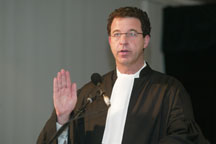 BEIRUT- A pro-Syrian group that claimed it killed a Lebanese editor has threatened to kill the next head of the UN commission investigating the assassination of former Prime Minister Rafik Hariri, the editor
BEIRUT- A pro-Syrian group that claimed it killed a Lebanese editor has threatened to kill the next head of the UN commission investigating the assassination of former Prime Minister Rafik Hariri, the editor
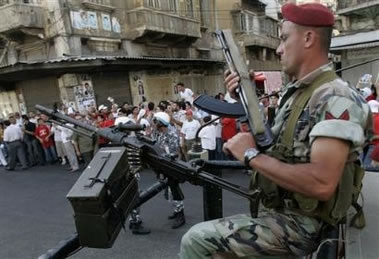 BEIRUT, 29 December (IRIN) – The Lebanese government has increased the presence of security personnel throughout the country ahead of New Year’s celebrations, following threats and a series of bomb attacks this year. "We have doubled our patrols," said an official from the Beirut police who wished to remain anonymous. "From 700 staff we went up to 1,400," he added. Temporary checkpoints have been installed throughout the capital and night and day patrols have been brought up from 8 to 25, with 311 officers patrolling at night.
BEIRUT, 29 December (IRIN) – The Lebanese government has increased the presence of security personnel throughout the country ahead of New Year’s celebrations, following threats and a series of bomb attacks this year. "We have doubled our patrols," said an official from the Beirut police who wished to remain anonymous. "From 700 staff we went up to 1,400," he added. Temporary checkpoints have been installed throughout the capital and night and day patrols have been brought up from 8 to 25, with 311 officers patrolling at night.
Israeli warplanes have struck a Palestinian militant base in southern Lebanon. Two Palestinian were reportedly injured in the raid. The air strike followed a rocket attack against two Israeli towns near the Lebanese border. Israeli aircraft struck a base belonging to the Popular Front for the Liberation of Palestine General Command, a small pro-Syrian Palestinian militant group based in Naameh, about eight kilometers south of Beirut.
The strike followed a series of rocket attacks Tuesday night against the Israeli town of Kiryat Shmona and the nearby village of Shlomi. The area is a frequent target of rocket attacks from Lebanese territory. A spokesman for the Palestinian group targeted in Wednesday’s strike denied his group’s involvement in the rocket attacks. Most attacks against northern Israel are carried out by the Islamic militant group Hezbollah, but a Hezbollah spokesman also denied involvement in the latest rocket attacks.
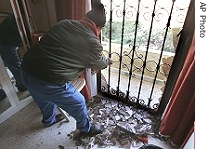 By Jim Teeple,
By Jim Teeple,


